
# 224
June 07, 2004
In this issue:
UNITED NATIONS IN KYRGYZSTAN (UN)
- Student Festival in Bishkek: "Millennium Development Goals are Kyrgyzstan's Goals"
UNITED NATIONS DEVELOPMENT PROGRAMME (UNDP)
- Batken is in the focus: A new programme of European Commission, Kyrgyz Government and UNDP on poverty reduction in Batken
- Batken is in the focus: The Festival “Young Talents 2004” Unites Tajik and Kyrgyz Children
- Batken is in the focus: Local Government Leaders Learn Modern Ways to Work
- Journalist Troops in Naryn: Theory and Practice
UNITED NATIONS CHILDREN’S FUND (UNICEF)
- Facts for Life Launched in Kyrgyzstan
- Fifth Dialogue of Generation: What are children thinking?
UNITED NATIONS IN KYRGYZSTAN (UN)
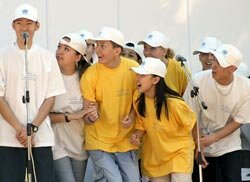 A new Millennium Development Goal No. 9 "To Smile to Each Other More Frequently" was proposed by Bishkek students during the Festival "Millennium Development Goals are Kyrgyzstan's Goals" on 21 May 2004. A new Millennium Development Goal No. 9 "To Smile to Each Other More Frequently" was proposed by Bishkek students during the Festival "Millennium Development Goals are Kyrgyzstan's Goals" on 21 May 2004.
The event supported by the UN System in Kyrgyzstan and the Kyrgyz Committee on Sports, Tourism and Youth Policies drew together the students from all Bishkek universities and turned into a dazzling and grandiose show.
"If you are the new generation, don't waste your time!" - a slogan by Asel Aitbayeva from the Kyrgyz-Russian Slavonic University read. "We all deserve a better future simply because we came to this world", a voice from the stage rang out.
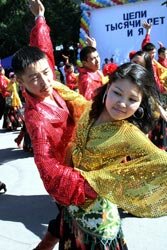 Young Kyrgyzstani gathered on that day to declare their goals in the new Millennium. Withstanding the heat they were dancing to the tunes of the brass band, singing, played street ball, running relays, participating in contests and entertained the big crowd at the Old Square of Bishkek for several hours. Young Kyrgyzstani gathered on that day to declare their goals in the new Millennium. Withstanding the heat they were dancing to the tunes of the brass band, singing, played street ball, running relays, participating in contests and entertained the big crowd at the Old Square of Bishkek for several hours.
The gala's organisers were the American University in Central Asia, Kyrgyz-Russian Slavonic University in cooperation with the Human Development Centre, Institute for Humanitarian Projects and UN Agencies in Kyrgyzstan.
During the preceding two-month-long information campaign, the students were getting ready to the Festival. They took part in presentations and seminars, discussed the MDGs and the role young people should play in achieving the Goals in Kyrgyzstan.
An exhibition of posters and slogans presented to the contest was set up on the square. The students were handing out T-shirts and caps with the MDGs symbols.
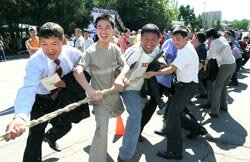 "The Millennium Declaration identified 2015 as the deadline to achieve the MDGs", said UN Resident Coordinator Jerzy Skuratowicz addressing the young people. "By that time you will be on your way to the apex of your professional careers, and that will be you who would make a decisive contribution for Kyrgyzstan to succeed in achieving the MDGs", he continued. "The Millennium Declaration identified 2015 as the deadline to achieve the MDGs", said UN Resident Coordinator Jerzy Skuratowicz addressing the young people. "By that time you will be on your way to the apex of your professional careers, and that will be you who would make a decisive contribution for Kyrgyzstan to succeed in achieving the MDGs", he continued.
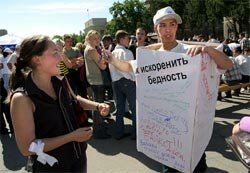 Eight contests, each for each MDG, were held during the Festival with an aim to select the best ideas of young people on how to fulfil the tasks of the Millennium Declaration. They were run under the following mottoes: "I Know How To Eradicate Poverty", "Let's Make Men's and Women's Rights Equal in Each Respect", "We'll Protect Children", "Let's Get Rid of AIDS", "We'll Protect Mothers", "Let's Give Children Real Education", "We'll Save the Earth for Future Generations", and "Global Partnership for the Planet's Prosperity". Eight contests, each for each MDG, were held during the Festival with an aim to select the best ideas of young people on how to fulfil the tasks of the Millennium Declaration. They were run under the following mottoes: "I Know How To Eradicate Poverty", "Let's Make Men's and Women's Rights Equal in Each Respect", "We'll Protect Children", "Let's Get Rid of AIDS", "We'll Protect Mothers", "Let's Give Children Real Education", "We'll Save the Earth for Future Generations", and "Global Partnership for the Planet's Prosperity".
Planting eight blue fur trees in the centre of Bishkek became the climax of the Festival. "It was not for nothing that our forefathers worshiped blue fur trees", said the masters of ceremonies. "The air and the soil around them are especially clean. May these wonderful trees grow on the Kyrgyz soil symbolising eight virtuous Millennium Goals!"
For additional information, please contact Olga Grebennikova, UNDP Public Relations Officer. Tel.: 61-12-13. Email:
UNITED NATIONS DEVELOPMENT PROGRAMME (UNDP)
A new programme of European Commission, Kyrgyz Government and UNDP on poverty reduction in Batken.
An official ceremony of signing a joint program of the European Commission, Kyrgyz Government and UNDP - ”Addressing the Social Consequences of Transition in the Ferghana Valley” – was held in Batken on June 2, 2004.
Representatives of the President’s Administration, UNDP and the European Commission visited Batken to participate in the ceremony.
The program will be implemented in Batken province of the Kyrgyz Republic, but will also cover the cross border regions of Tajikistan. The main goal of the project is poverty reduction, contribution to development and stability in the cross-border regions of the two countries in the Ferghana Valley.
European Commission and UNDP Joint projects will be realized in three separate, but closely related sectors, which include:
-
Agricultural Development Component aiming at improving the living standards of the population of Batken and Leilek districts by means of creating favorable conditions for agricultural development.
-
Social Safety Net Training Component aiming at improving both urban and rural livelihoods through reduction of unemployment.
-
Water Management Component, aiming at improving the living standards of Batken and Leylek district rural population through building or rehabilitating the water-supply systems.
The program will be funded by the European Commission (total cost equals to 2, 3 million EU) and implemented by UNDP.
For additional information, please contact Aikan Mukanbetova, UNDP Programme Officer. Tel.: 61-12-13. Email:
The Festival “Young Talents 2004” Unites Tajik and Kyrgyz Children
Over 200 gifted children from Kyrgyzstan and Tajikistan gathered to participate in the festival of “Young Talents 2004” in the village of Aydarken, Batken district, on May 22-23, 2004.
The festival was initiated by the Batken province state administration and supported by UNDP Kyrgyzstan and UNDP Tajikistan within the framework of the program of cross border cooperation in close partnership with the International Humanitarian Foundation “Meerim”.
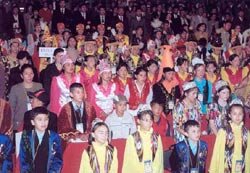 The young talents taking part in the festival represented all the ethnic groups from four cross-border communities of Leilek and Batken areas in Kyrgyzstan and Jaborasulov and Isfarin areas in Tajikistan together with the Tajik cities of Khujand and Isfara. The young talents taking part in the festival represented all the ethnic groups from four cross-border communities of Leilek and Batken areas in Kyrgyzstan and Jaborasulov and Isfarin areas in Tajikistan together with the Tajik cities of Khujand and Isfara.
“It’s long I have not had so much fun” – said Abdugafor Oltimishev, Head of Tajik Delegation. “Kyrgyz, Tajik, Uzbek and Russian children were participating in this festival like the members of one big friendly family. It was the first time after the collapse of the Soviet Union that our children gathered at such a grand festival”.
Over 1000 spectators were enjoying the children’s creativity for two days. Young singers and dancers dressed in national costumes, as well as tellers of Kyrgyz folk epos were replacing one another. Governor of Batken province Askar Shadiev as well as all the representatives of the state administrations was dancing together with the children at the final discotheque.
“I felt much younger”, admitted Turgunay Aytmatova, Deputy Head of Kadamjay District Administration of Kyrgyzstan. “Children are the best we have. And when we see how talented they are, how friendly they can be with one another - our hearts are filled with joy.”
It is well known that arts can serve as a bridge connecting people; it helps them find common language. That is why the UNDP offices in Kyrgyzstan and Tajikistan give such an importance to organizing different festivals, sport competitions, exhibitions and concerts in the cross-border areas of the two countries.
“People, divided by the borders, but linked with common history, traditions and cultural roots, are easily interested in holding such events”, said Bakhram Fayzyllaev, Coordinator of the Cross-Border Program, UNDP Tajikistan. “Children cannot palter and the friendship which started at this festival will strengthen common understanding and cooperation among the communities in both our countries.”
For additional information, please contact Mia Rimby, UNDP Programme Officer. Tel.: 61-12-13. Email:
Local Government Leaders Learn Modern Ways to Work
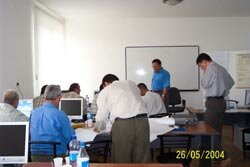 Since the beginning of 2004, the UNDP program on local self-governance in close cooperation with GTZ (Germany) conducts the series of training workshops for the leaders of local government bodies in Batken province. Since the beginning of 2004, the UNDP program on local self-governance in close cooperation with GTZ (Germany) conducts the series of training workshops for the leaders of local government bodies in Batken province.
The trainings aim at raising the efficiency of the local self-government bodies and increasing the population’s participation in the process of development. The training curriculum focuses on the issues, such as: new laws in the field of local self-governance, modern management skills, partnership with local communities and the role of local councils in managing the districts.
Since the beginning of 2004, 36 local self-government leaders from Batken, Leylek and Kadamjay districts have passed the training course. As a result of these trainings, in the nearest future, local government bodies of Batken district with the population’s active participation will review the local self-governance regulations and municipality passports in accordance with the changes in Kyrgyz legislation.
It is expected that this will let the Laws of the Kyrgyz Republic really work on the spots fostering development of the districts and increasing the population’s participation in the decision taking processes.
For additional information, please contact Alexander Kashkarev, UNDP Programme Officer. Tel.: 61-12-13. Email:
An out-training was held for the members of UN Journalist Club in Naryn in the beginning of May.
Over 20 leading journalists from Bishkek representing different newspapers as well as TV and Radio companies, made a trip to this highland part of Kyrgyzstan, where the poverty level is also one of the highest in the country. The trip aimed at learning about the work and results of the UNDP Poverty Reduction Program.
Meeting with Chingiz Ismailov, deputy governor of the Naryn province opened the journalists’ visit. “We were waiting for your arrival, but we would never imagine there would be so many of you”, said Mr. Ismailov. “It is for the first time in the history of the province that such a considerable journalist representation comes to Naryn.”
In line with the well-established practice, every year, UNDP organizes the press trips to the regions, where the UNDP programs on poverty reduction, local governance, preventive development, environment protection, AIDS prevention and etc. are implemented in order to let the representatives of the so called “fourth power” see with their own eyes the changes happening in people’s lives as a result of the programs.
This time, the trip agenda was designed so that along with the actual visits to the pilot villages and meetings with the program beneficiaries, the journalists could get a short theoretical course. The goal of the training was to provide the mass media representatives with the deep information on the technology of the poverty reduction program as well as the methods and approaches used by the UN volunteers and program staff on the spot in order to ensure program success and sustainability.
This included the criteria for selecting the pilot villages and establishment of the self-help groups there as well as way of educating the local population in micro-crediting, essential principles of small business development and accounting, creation of saving funds and establishment of close partnerships between the associations of self-help groups and local government bodies.
To see the results of the poverty reduction program in practice, the journalists visited two pilot villages of Naryn district.
In the village of Toguz Bulak, the program started recently – by the end of 2003. In Soviet times, the village was a part of the collective farm (kolkhoz) earning millions. The population was doing cattle-breeding and had a lot of sheep and horses. People earned good money and the kolkhoz had its deserved place on the Republican Board of Honor.
The situation changed with the collapse of the Soviet Union and the beginning of reforms in Kyrgyzstan. The population’s living standards were steadily going down and already by the time of UNDP Poverty Reduction program intervention the number of the poor in the village equaled 80% of the total population.
Nowadays, people become the members of the self-help groups and learn to plan their lives anew. The journalists could not see any sufficient changes in the village, but they saw how the people united to reach a common goal work together to rehabilitate the water pipes supplying their fields with water, how they build the plans for reconstruction of the village bathhouse and growing their own apple garden. The inhabitants of the village no longer wait for the changes that will happen by themselves, due to an order from Bishkek. People have started to change their lives with their own hands.
The second village visited by the journalists, has been included in the program, since 1999. Located in an unfavorable area for farming and detached from the regional center Naryn, this village complied with all the criteria for being included in the poverty reduction program. Besides, severe climate (in winter, the temperature falls down to -45Co) has made the life of the villagers even more difficult urging them spend considerable part of their income for heating their houses in winter times.
Thanks to the program, the villagers managed to change the life in the village fundamentally. There functions a village bank which successfully provides credits to the inhabitants of not only the same but also the neighboring villages expanding its credit portfolio every day. The self-help groups do cattle breeding and wool processing. Women produce the felt carpets of such a quality and beauty that they are happily bought in Switzerland. And despite the fact that the village population is much better off nowadays and no longer need permanent UN volunteer support, they still remain the most desirable guests of the village, as the Kyrgyz people never forget those who extended a hand of support and assistance in difficult moments.
For additional information, please contact Olga Grebennikova, UNDP Public Relations Officer. Tel.: 61-12-13. Email:
UNITED NATIONS CHILDREN’S FUND (UNICEF)
Facts for Life Launched in Kyrgyzstan.
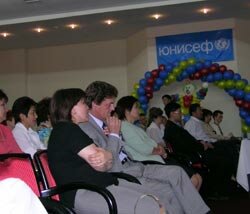 On June 1st 2004 the Kyrgyz Deputy Ministry of Health Mr. Melis Madybaev and the UNICEF Resident Representative the Kyrgyz Republic Mr. Richard Young launched the third edition of the Facts for Life in Kyrgyz and Russian languages. On June 1st 2004 the Kyrgyz Deputy Ministry of Health Mr. Melis Madybaev and the UNICEF Resident Representative the Kyrgyz Republic Mr. Richard Young launched the third edition of the Facts for Life in Kyrgyz and Russian languages.
The guests could watch a video presentation of the book. It provided a brief overview of all the sections of the book and shared opinions of those who benefited from the previous edition. Since the 1998 edition, families from all over the republic and especially those from rural areas expressed a great demand for this book.
This time, UNICEF supported publication of 7,000 books in Russian and 11,000 books in Kyrgyz. UNFPA and some other organizations have already expressed their commitment to provide funds for broader dissemination of the book.
Richard Young stressed that 7 out 10 children’s deaths can be prevented if parents and other family members have proper knowledge and skills to cope with pneumonia, diarrhea, measles, malaria and malnutrition as well as to protect women during pregnancy and childbirth. All this and other important information can be found in the Fact for Life. The messages are based on the latest scientific findings as established by medical experts around the world. At the same time, the messages are presented in a simple language and are easily understood and can be acted upon by people who do not have scientific background.
The speakers appealed to health workers, teachers, students, government officials, media, community workers, religious leaders to help communicate Fact for Life messages to families who are the primary duty bearers to ensure the rights of children.
Mr. Madybaev thanked UNICEF for its permanent assistance and shared his experience from the UNICEF supported intergeneration dialogue that took place on the previous day. There he could discuss with street and institutionalized children ways to ensure that all children in the Republic could realize their rights to survival and heath care services.
Most of the launch participants - health workers from the oblasts got together on the next day to decide upon communications strategy for promotion of the messages of the Facts for Life. The role of coordinators will lie on the Province Health Promotion Offices. On the part of UNICEF, Richard Young reassured that UNICEF will continue its support to improve health services for children.
Fifth Dialogue of Generation: What are children thinking?
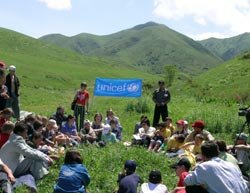 The fifth Inter-generation Dialogue between street and institutionalized children on one hand and representatives of ministries on the other took place on 31 May 2004 in the Chon Tash Tourist Base. Kyrgyz Deputy Minister of Labour and Social Protection Ms. Uktomkhan Abdullaeva and Kyrgyz Deputy Minister of Health Mr. Melis Madybaev have kindly participated in the dialogue. The fifth Inter-generation Dialogue between street and institutionalized children on one hand and representatives of ministries on the other took place on 31 May 2004 in the Chon Tash Tourist Base. Kyrgyz Deputy Minister of Labour and Social Protection Ms. Uktomkhan Abdullaeva and Kyrgyz Deputy Minister of Health Mr. Melis Madybaev have kindly participated in the dialogue.
80 children participated in the mountainous competitions that proceeded the dialogue and delegated 15 girls and 15 boys to have an intercourse with the decision makers. There were many questions:
- Why there are many luxurious cars and houses in the city, but the number of street children is growing?
- Why our relatives do not have jobs, though our republic makes so much borrowing?
- Why so little attention is paid to education of street and simple children?
- Why institutionalized children cannot go to mountains to have a rest?
- Why institutionalized children are not allowed to visit their families as often as they want?
- Is it possible to establish of special classes at school for children who catch up with their peers?
- Is it possible to simplify school entrance?
- Why there are not enough teachers in children’s institutions? Why their salaries are so small?
- Many of street children want to have a military career. Can they get necessary education?
- Is it possible to establish an organization that will help institutionalized children to find a job, so that they can earn money to buy books, note books, pens to provide for their schooling?
- Why nobody helps their families?
- What should children do after leaving children’s institutions?
All children were dreaming to live in families and study at school.
The Kyrgyz Deputy Minister of Labour and Social Protection told the children what the Ministry is doing to support families, she invited children to submit project proposals. The Kyrgyz Deputy Minister of Health told children that they could get health services free of charge and promised that he would punish those doctors who demanded that children pay for the treatment.
The adults had also questions, including the following:
- How children can be protection from experimenting with drugs?
- How to establish communications with street children to get their views?
Natasha from the Voenno-Antonovski Children’s Institution suggested that similar dialogues should be conducted regularly. The only problem is that not all the children related decision makers are interested in meeting children. At the next dialogue, the children would like to talk with representatives of the Kyrgyz Ministries of the Interior, Justice and Education.
The organizers expressed special thanks to the National Guard Commander-in-Chief General-Lieutenant Mr. Abdygul Chotbaev and officers of the National Guard who provided extensive support in organizing mountainous competitions and became true friends of the children.
For additional information, please contact: Galina Solodunova, UNICEF Communications Officer. Phone: (996 312) 611 211 (ext.139); 611 224...7, e-mail:
|

